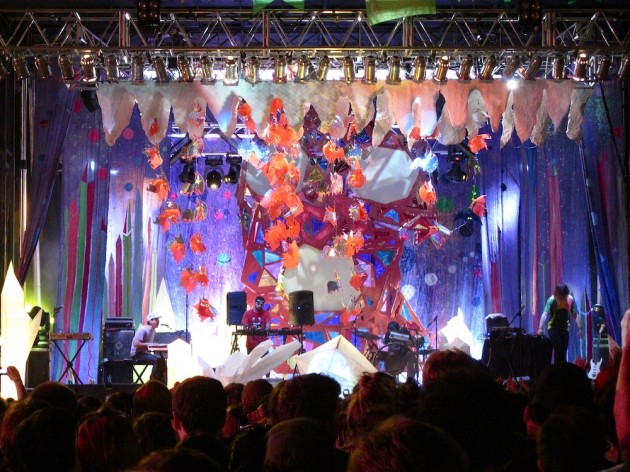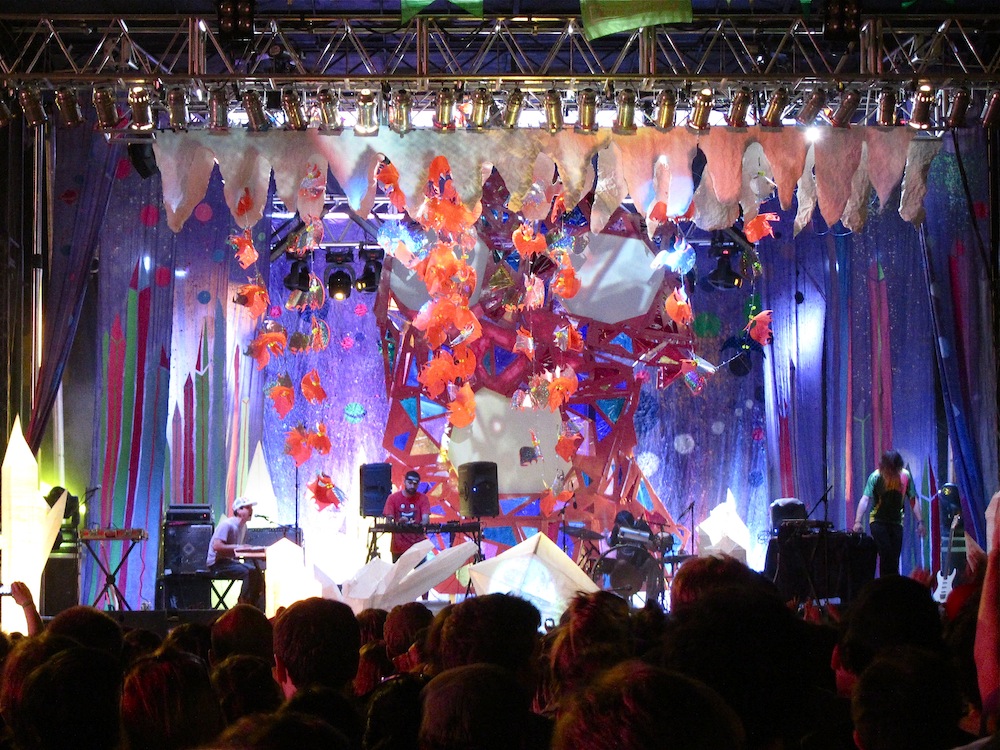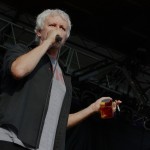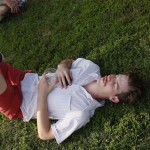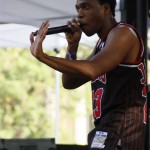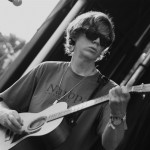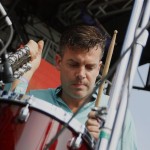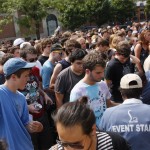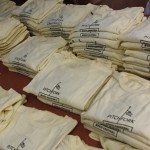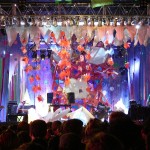
All Photos by Christopher Alvarez
The Pitchfork Music Festival remains one of the most eclectic and accessible festivals – monetarily and otherwise – on the North American summer circuit. The fest regularly features some of the most interesting and in-demand indie rock, electronic, and hip hop artists. In addition to the festival’s signature taste in lineups, the care and presentation of the Pitchfork Music Festival exceeds most other large music fests. Water is always plentiful and free to all festival patrons. Medical care and security regularly make rounds to ensure the safety of all attendees, and in large part they aren’t intrusive to the festival experience. That isn’t to say Pitchfork hasn’t developed any negative qualities as it has expanded in popularity and size. New to the 2011 version are the boom cameras that now stand behind the crowd fence, pushing the crowd further away from the stage and obstructing views for many. Perhaps most frustrating, though somewhat understandable, are the additional scheduling conflicts that have arisen with this year’s expanded lineup size which will be addressed later.

Gatekeeper
Gatekeeper, the Chicago and Brooklyn based electronic duo, opened the blue stage and kicked off the festival in a swirl of sonic orgasms. As is sometimes the case with small electronic acts, their live production is minimal, keeping the focus solely on the sound and the performance. The crowd for Gatekeeper was sparse, as well, though such should be expected with a 3:30 Friday time slot. Those in attendance weren’t particularly validated, unfortunately. Comparatively speaking, Matthew Arkell is the excitable member of the two. His movements and expressions at least hint that he’s excited to be there. Aaron David Ross, however, seemed absolutely reticent and disinterested. On some level this makes sense, as their sound is designed to reflect the 8-bit video gaming and B-level horror movies they grew up watching. Both cases are sedentary activities, as was their performance at Pitchfork.
EMA
Erika M. Anderson hails from South Dakota. This isn’t just some trivial biographical detail; it informs her music and her stage presence. Not only did Erika discuss the time Boyz II Men visited Sioux Falls’ Empire Mall, but she sings about how this has made her a person of interest and substance. Or at least, how she thinks that was true. Now a resident of Oregon, Erika has mellowed in her own eyes. Thankfully, her music hasn’t. More specifically, it’s harsh and jagged. At Pitchfork, EMA’s guitars buzz more often than they rang, which fit her rough, somewhat guttural voice just fine. As she did in her sound check, she shredded her Fender Mustang in a more literal fashion than most, causing longer breaks between songs for retuning and repair. She’s still the guitar demonette of Gowns and Amps For Christ. The standout performance of her set was “California,” where her lyrics gain an additional context missing from the recorded version. When the guitar roars were (temporarily) put aside, EMA produced a very tender, very convincing performance of “Marked.” As with “California,” lines such as “I wish that every time you touched me left a mark” cut especially deep.
Tune-Yards
Merrill Garbus developed her craft as a one woman band. She no longer performs in that format, however the vestiges of that earlier incarnation of Tune-Yards are still readily apparent. She builds each drum and vocal loop one piece at a time, slowly and meticulously. This method gives audience members a rare behind-the-veil look at Garbus’ creative process. It also gives them an understanding of how difficult the tactic is. There were multiple technical issues early in the set. However, Garbus and company chugged right on through the problems, never breaking stride for a second. It’s part of their performance art. When the looping instruments did work, festival goers were treated to Garbus’ peculiar Afro-rhythms. Those beats, grown out of a college study abroad to Kenya, gives the music a texture otherwise missing from the Pitchfork Music Festival. Still, at their core, Garbus’ tunes are pop songs. Nowhere is this better exemplified than on their renditions of “Powa” and breakout track, “Bizness.” Tune-Yards performance is another notch on the belt of what has been a monstrously successful year for the group.
Thurston Moore
By no fault of his own, Thurston Moore’s placement on the Friday fest schedule proved to be his undoing. Because he performed directly before Guided By Voices – and at the adjacent stage no less – much of the audience present was really just waiting around for GBV. This led to much irreverence and chatter, which is a shame, because Thurston Moore put on a rather satisfying set. He even cracked a joke about playing songs dedicated to the promotion of rape, violence, and mayhem (a reference to the upcoming controversial performance by Odd Future Wolf Gang Kill Them All on Sunday). Deviating from his usual electric guitar wizardry in Sonic Youth, Moore and band put on an all-acoustic performance. While each song proved rewarding, the best in show for Moore’s set was a new track off his latest solo album, titled “Benediction.”
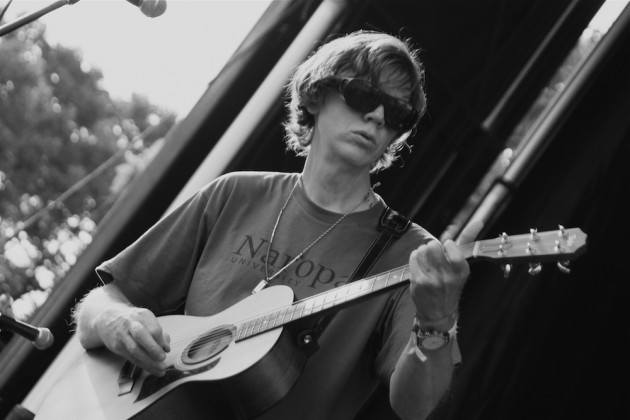
Guided By Voices
I was too young to see the original Guided By Voices as they built their legacy back in the early-nineties, so perhaps my praise for the group’s performance may come across as naïve or even ignorant. That said, GBV’s set was not only a triumph for rockers over 50, but in my mind was the best and most enjoyable set of the day. Robert Pollard’s stage banter was a treat, almost as much so as the music. The band tore through GBV classics like “Jane Of The Waking Universe” and “Gold Star For Robot Boy.” A crucial moment came on the latter, during which guitarist Mitch Mitchell lost his cigarette while performing some guitar jumps. Without missing a beat, a stage hand whipped out a new cigarette, lit it, and then placed it into Mitchell’s mouth. It goes to show how dedicated GBV is to their old ways, even if it has “slowed them down” in the eyes of the older fans standing near me during the performance.
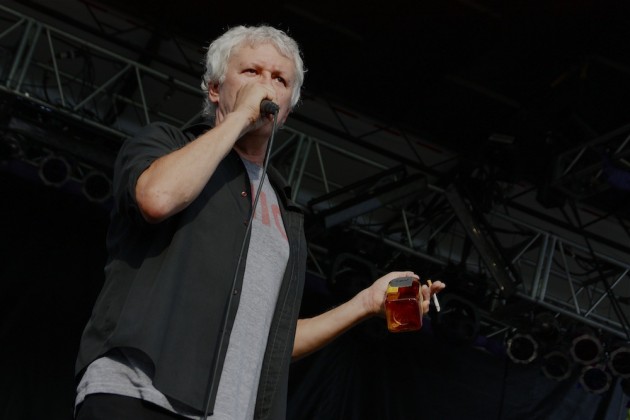

Neko Case/James Blake
Here was another case of a terrible scheduling conflict. Given the year he’s having, there’s no way I could miss James Blake’s set. However, that meant missing the rich, sultry tones of Neko Case. It was a huge disappointment for me that I was unable to see much of her set. As such, there’s very little to say about it other than she sounded great. As for Blake, he too performed well. I had my doubts about how the tracks of his self titled debut album would work live. Turns out they do pretty well. The crowd got completely into the show during “Limit To Your Love,” though the highlights came on the performances of tracks from his EPs. “CMYK” got just about everyone in the crowd moving, setting up for “Klavierwerke.” The latter songs intense, textured bass completely demolished the audience, which is in no way meant to be a negative. Had the sun set before Blake’s set, it would have contended with Guided By Voices for the best performance of the day.

Animal Collective
Headlining the first day at Pitchfork were Animal Collective, marking a return to the festival for Panda Bear. Last year, he played a late day solo show leading up to that day’s headliner, LCD Soundsystem. It’s my belief that Panda Bear’s solo work doesn’t project particularly well in settings such as this, and last year’s performance did nothing to change that opinion. This year he’s not only returned to Animal Collective, but he’s taken up a new residence behind the drum kit. A far cry from the keyboard and voice show he put on in 2010. Also surprising is the set list, which includes little of the group’s most recent album, Merriweather Post Pavilion. Instead, Animal Collective built their set on new material. Some of it was densely layered and exciting. Some of it, like the tune using African-beats, just plods about without purpose. It wasn’t a complete failure as there were moments of the slick melodies that propel the best songs on their albums. However, for the second year in a row the opening night headliner has left the Pitchfork audience unfulfilled.
